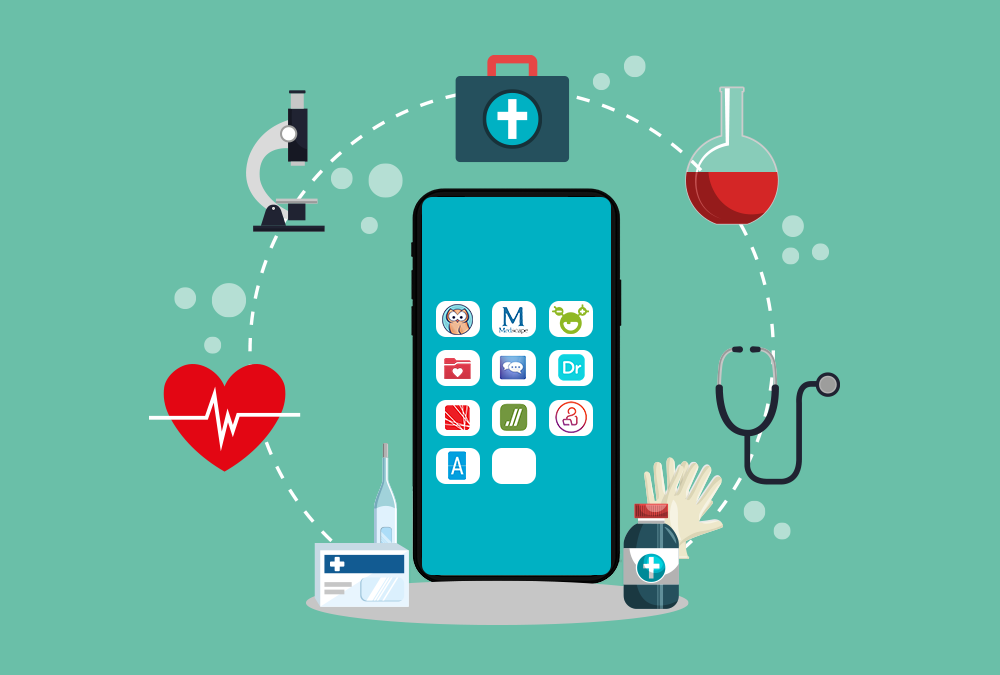Healthcare apps are revolutionizing the way patients manage their health, providing innovative solutions for individuals battling chronic conditions like cancer. These applications utilize advanced algorithms to offer personalized healthcare, adapting to each user’s changing needs and preferences. For instance, cancer support apps are designed to deliver real-time assistance to patients undergoing treatment, ensuring they adhere to medication regimens despite the challenges they face. By integrating cutting-edge reinforcement learning in health, these tools can provide adaptive intervention technology that tailors support precisely when it’s needed most. As health management tools continue to advance, they not only empower users but also foster a community of support that can significantly enhance patient well-being.
Digital health applications, often referred to as mobile health (mHealth) solutions, are becoming essential companions for individuals navigating their wellness journeys. These intuitive platforms are particularly impactful for those requiring consistent care, such as cancer survivors or individuals managing chronic illnesses. By employing sophisticated algorithms, these applications conduct personalized analyses that evolve as users interact with them, thereby offering timely and effective healthcare interventions. Furthermore, adaptive technologies embedded within these apps ensure that patients receive the right type of support tailored to their unique circumstances, thus improving adherence to treatment plans. As personal healthcare becomes more reliant on technology, it’s clear that these innovative mobile tools play a critical role in enhancing patient outcomes.
Understanding Healthcare Apps: The Future of Personalized Support
Healthcare apps are revolutionizing the relationship between technology and patient care. These applications utilize advanced algorithms and machine learning to provide tailored support for users, particularly in managing chronic conditions or following medication regimens. By emphasizing personalized healthcare through real-time adjustments to user inputs, healthcare apps can significantly enhance patient engagement and adherence to treatment plans. As developments in artificial intelligence continue to progress, the potential for these apps to integrate adaptive intervention technology will only increase, allowing for more targeted strategies in health management.
One of the standout features of healthcare apps is their ability to learn from individual behaviors and habits. For instance, as seen in cancer support apps, this technology enables the application to offer relevant reminders and motivators precisely when they are needed. This dynamic approach to support can lead to better outcomes, as it directly addresses the unique challenges faced by patients. Furthermore, employing reinforcement learning techniques ensures that these apps become more adept at providing assistance over time, effectively becoming a personalized healthcare coach in the user’s pocket.
Cancer Support Apps: Tailored Solutions for Patients
Cancer support apps have emerged as crucial tools in aiding patients navigate their complex health journeys. These apps offer personalized healthcare plans developed through sophisticated algorithms that account for each patient’s specific medical history and treatment requirements. By employing reinforcement learning, cancer support apps adapt their recommendations based on ongoing feedback and interactions, helping to optimize patient care during critical recovery periods such as post-stem cell transplantation.
Additionally, these apps not only focus on medication management but also enhance the emotional support system available to patients. Many cancer support apps foster community engagement among users, enabling them to connect with others undergoing similar experiences. This social support aspect can significantly benefit patients emotionally, as having a strong network can improve their mental well-being and overall health outcomes. By continuously improving their functionality, cancer support apps exemplify how technology can play a transformative role in modern healthcare.
Reinforcement Learning in Health: Revolutionizing Patient Engagement
Reinforcement learning in health is an innovative approach that is changing the way healthcare providers interact with patients. By employing algorithms that learn from user interactions, these systems can effectively personalize care recommendations and interventions. This technology allows healthcare apps to adjust their strategies based on individual patient feedback, resulting in a more engaging experience. For example, patients using such systems can receive timely reminders about medication doses, tailored advice, and motivational incentives based on their unique progress and preferences.
The integration of reinforcement learning not only promotes better adherence to treatment protocols but also empowers patients to take a more active role in managing their health. As patients receive more relevant and personalized information, they become more invested in their treatment journey. Additionally, such adaptive systems improve the overall quality of healthcare delivery by recognizing and responding to real-time changes in a patient’s health status or environment.
Adaptive Intervention Technology: A Game Changer for Chronic Conditions
Adaptive intervention technology represents a significant advancement in how healthcare approaches chronic disease management. By utilizing real-time data and machine learning techniques, healthcare apps can offer dynamic support tailored to the patient’s immediate health context. This technology is particularly beneficial for conditions that require regular management, such as diabetes or cardiovascular diseases. An app employing adaptive interventions can adjust its recommendations and support tools based on the patient’s responses, promoting a more effective treatment strategy.
Moreover, adaptive intervention technology enhances patient empowerment by providing users with control over their health management. Instead of a one-size-fits-all solution, these tools offer customized advice based on collected data, increasing the relevance of the support provided. Research has shown that patients who engage with adaptive intervention systems report greater satisfaction with their healthcare experience, highlighting the potential of this technology to foster a more effective and personal method of chronic disease management.
Health Management Tools: Supporting Patients in Their Journey
Health management tools have become indispensable for individuals seeking to manage their well-being effectively. From tracking medications to monitoring vital signs, these tools allow patients to take ownership of their health while providing critical data to healthcare professionals. By integrating healthcare apps into their routines, users can customize their health monitoring, receive timely alerts about medication schedules, and access necessary resources at their fingertips. This level of personalization not only aids in adherence but also enhances the quality of communication between patients and providers.
As technology continues to advance, health management apps increasingly incorporate features powered by artificial intelligence and data analytics. These advanced functionalities can interpret user data more accurately, offering predictive insights that lead to better health outcomes. Moreover, the evolving landscape of health management tools means that patients not only receive standardized care but also tailored recommendations that suit their individual health needs.
The Role of Social Support in Healthcare Apps
Incorporating social support within healthcare apps can significantly enhance user outcomes. By connecting patients with peers and caregivers, these apps foster a sense of community and shared experience. This relationship is especially beneficial for individuals dealing with chronic illnesses or recovery after medical procedures. For instance, cancer support apps that allow users to share their journey with others can provide morale-boosting encouragement while helping to overcome challenges associated with treatment.
Additionally, social features can also promote accountability and motivation. When users engage with their support networks through healthcare apps, they are more likely to stick to their treatment plans and adhere to health-related recommendations. This integration of social support into digital health solutions can transform a solitary journey into a collaborative effort, ultimately leading to improved health management and emotional well-being.
The Future of Personalized Healthcare with Apps
The future of personalized healthcare lies in the continued development of sophisticated healthcare apps that leverage the power of technology. As machine learning and artificial intelligence evolve, these applications will become even more adept at providing tailored recommendations and interventions based on user data. With increased accuracy in understanding patient needs, healthcare apps can facilitate proactive health management and support initiatives that lead to better patient outcomes.
Moreover, as more healthcare providers recognize the value of integrating these applications into patient care, we can expect a broader adoption of mobile health solutions. This shift will likely usher in a new era of patient-provider collaboration, where digital tools become essential components of treatment plans. The landscape of healthcare will continuously adapt, driving innovation that prioritizes the unique needs of each patient, thus redefining the future of personalized healthcare.
Challenges in Developing Effective Healthcare Apps
Developing effective healthcare apps comes with its own set of challenges that need to be addressed to maximize their potential. One of the primary issues is ensuring that the algorithms used are both reliable and trustworthy. The complexity of human health behaviors means that health apps must deal with varied factors that can influence user interactions. This makes it essential for developers to implement robust testing and validation processes before deployment to ensure that their algorithms effectively promote users’ health and well-being.
Additionally, user privacy and data security remain significant concerns in the healthcare app landscape. With sensitive health information being processed and stored, developers must adhere to stringent regulations and best practices to protect personal data. Ensuring user confidence in these technologies is crucial for adoption and long-term success. Navigating these challenges is a vital step toward harnessing the full potential of healthcare apps in promoting better health management.
The Impact of Technology on Future Healthcare Solutions
Technology continues to reshape the healthcare landscape, paving the way for groundbreaking solutions that enhance patient care. Innovations such as telemedicine, artificial intelligence, and data analytics are driving the development of more sophisticated healthcare apps that provide valuable support for patients. By leveraging these technologies, clinicians can monitor patient progress more effectively, optimize treatment protocols, and promote better health outcomes across the board.
Moreover, as we move toward a more integrated healthcare system, technology is expected to play a critical role in bridging gaps between patients and providers. By utilizing health management tools and personalized healthcare apps, patients can access tailored resources and support while actively participating in their health management. This transformation of healthcare solutions will foster a collaborative approach, ultimately improving the overall quality of care each patient receives.
Frequently Asked Questions
What are cancer support apps and how do they work?
Cancer support apps are specialized healthcare applications designed to assist patients undergoing treatment, such as those recovering from stem cell transplants. They utilize algorithms, including reinforcement learning, to offer personalized guidance and support, helping users adhere to medication protocols and manage their overall health effectively.
How does personalized healthcare improve outcomes for patients using healthcare apps?
Personalized healthcare through healthcare apps tailors interventions based on individual user data and preferences, leading to improved adherence to treatment plans. These apps can adapt content and timing of reminders, making them more relevant and effective in supporting patient health management.
What role does reinforcement learning play in health management tools?
Reinforcement learning enhances health management tools by enabling them to learn from user interactions and adapt in real-time. This technology allows apps to optimize their responses and interventions, increasing user engagement and ensuring that the support provided is timely and relevant.
Can adaptive intervention technology improve medication adherence in cancer patients?
Yes, adaptive intervention technology can significantly improve medication adherence among cancer patients. By using algorithms that adjust based on patient behavior and feedback, these healthcare apps can send personalized reminders and motivational prompts that resonate more with users, thus fostering better adherence to treatment regimens.
What are some examples of health management apps focused on chronic conditions?
Examples of health management apps include those developed for cancer support, such as the ADAPTS HCT app for stem cell transplant patients and MiWaves for young cannabis users. These apps leverage reinforcement learning to create a personalized experience, addressing specific health challenges faced by users.
How do healthcare apps promote collaboration between patients and caregivers?
Healthcare apps enhance collaboration by providing joint platforms where both patients and caregivers can receive tailored notifications and support. Features such as shared reminders and games encourage interaction and teamwork, helping to improve the healthcare outcomes for patients.
What is the significance of just-in-time adaptive interventions in healthcare apps?
Just-in-time adaptive interventions are crucial as they allow healthcare apps to deliver support precisely when it is needed, rather than in a generalized manner. By monitoring users’ changing needs, these apps can adapt their interventions, improving the overall effectiveness of health management.
Are healthcare apps accessible for all patients, regardless of their condition?
While many healthcare apps are designed to assist specific patient groups, such as those with cancer or chronic conditions, there is a growing trend towards making these technologies accessible to a broader audience. This includes patients with varying needs to support diverse health management goals.
What challenges do healthcare apps face in real-world settings?
Healthcare apps encounter challenges such as ensuring data accuracy, managing user engagement, and adapting to diverse user needs. Factors like software errors and the complexity of human behavior can affect how effectively these apps learn and support health management.
How can feedback from users improve the effectiveness of healthcare apps?
Feedback from users is vital for enhancing the effectiveness of healthcare apps. By integrating user insights, app developers can refine algorithms and intervention strategies, ensuring that the support provided aligns better with user preferences and behaviors.
| Key Point | Details |
|---|---|
| Target Audience | Cancer patients and caregivers, cannabis users, adolescents after stem cell transplantation. |
| Personalized Support | Utilizes advanced algorithms for real-time personalization of health interventions. |
| Adaptive Learning | Apps learn from user interactions to improve engagement and support adherence. |
| Current Projects | ADAPTS HCT for stem cell transplant patients, MiWaves for cannabis abuse, and Oralytics for tooth brushing adherence. |
| Clinical Trials | ADAPTS HCT trial focusing on adolescent patients starting in 2025; previous trials for Oralytics completed with promising results. |
Summary
Healthcare apps are revolutionizing how patients manage their health, providing tailored support and real-time feedback to boost adherence to treatment protocols. By leveraging advanced algorithms and machine learning, these applications are designed to act as personal healthcare coaches, adapting to user needs and promoting better health outcomes. With continuous advancements in this field, healthcare apps like ADAPTS HCT are set to make a significant impact on patient care, especially for vulnerable populations such as cancer patients and their families.



